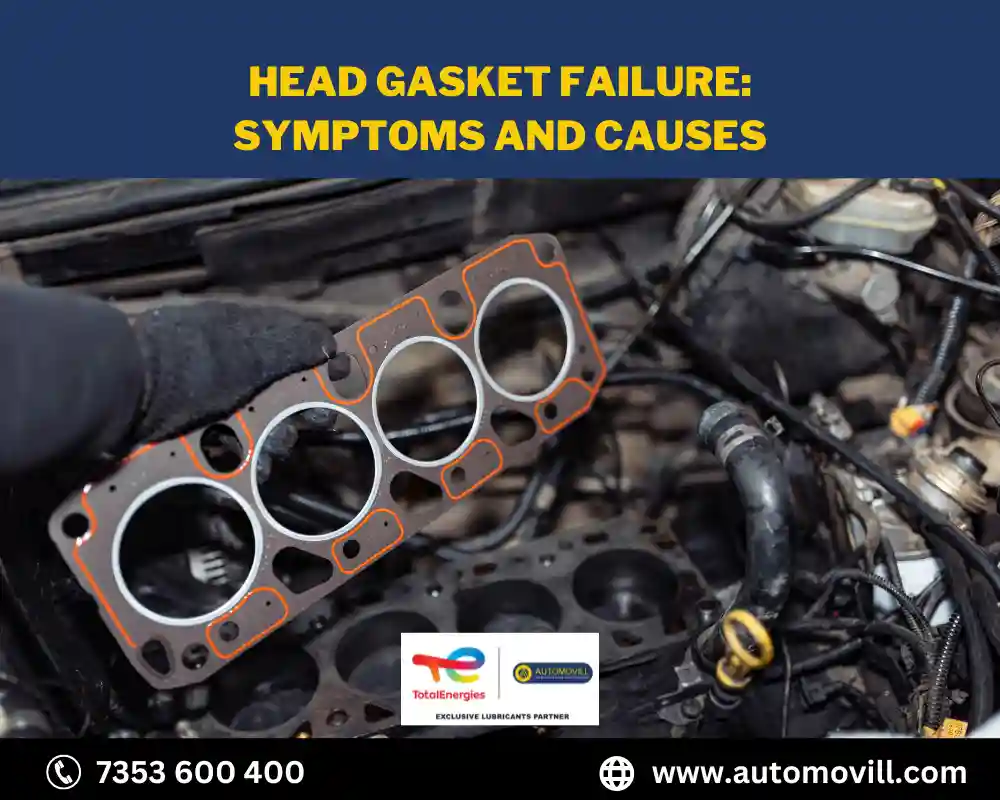
Your car’s engine is a marvel of engineering, comprising numerous components working together to keep you on the move. One crucial component that plays a vital role in this symphony is the head gasket.
Though small in size, the head gasket serves a mighty purpose, sealing the gap between the engine block and cylinder head to maintain combustion pressures and ensure smooth engine function.
However, when the head gasket fails, it can lead to a cascade of issues that may have a significant impact on your vehicle’s performance and safety.
In this blog, we will delve into the symptoms, causes, early stages of head gasket failure, and whether it’s safe to drive with this problem.
Symptoms of Head Gasket Failure
Here are 6 common symptoms that indicate the failure of a head gasket:
1) Overheating
One of the most common signs of a failing head gasket is engine overheating. As the gasket deteriorates, it can allow coolant to leak into the combustion chambers, resulting in the engine running hotter than usual. Constant overheating can lead to complete engine failure if not addressed on time.
2) White Smoke
A head gasket leak allows the coolant to mix with engine oil or enter the exhaust system. The result is the production of white smoke from the tailpipe, signaling a potential head gasket issue.
3) Milky Oil
Check your engine’s oil regularly. If you notice a milky or frothy appearance on the dipstick or inside the oil cap, it indicates that coolant is contaminating the oil due to head gasket failure.
4) Loss of Coolant
If you frequently find yourself refilling the coolant reservoir without any visible leaks, it could be a sign of a head gasket problem. Coolant may be escaping through the damaged gasket, leading to a drop in coolant levels.
5) Poor Engine Performance
A faulty head gasket can disrupt the combustion process, resulting in decreased engine performance, reduced power, and rough idling.
6) Bubbles in the Radiator
Air bubbles appearing in the radiator when the engine is running can be an indication of combustion gases entering the cooling system due to a head gasket breach.
Causes of Head Gasket Failure
Head gasket failure can be attributed to various factors, including:
1) Overheating
Excessive engine temperatures can cause the head gasket to warp or crack, leading to failure.
2) Engine Misfire
A misfiring cylinder can create pressure imbalances that put a strain on the head gasket. Read engine misfire causes and symptoms here.
3) Poor Installation
If the head gasket is not installed correctly during engine assembly or repair, it can lead to premature failure.
4) Age and Wear
Over time, the head gasket undergoes thermal stress and wears out, increasing the risk of failure, especially in older vehicles.
5) Coolant Contamination
The presence of corrosive elements or oil contaminants in the coolant can degrade the head gasket.
Early Stages of Head Gasket Failure
Detecting head gasket failure in its early stages can prevent more extensive engine damage. Early signs may include:
- Minor Coolant Leakage: Small leaks that aren’t immediately noticeable can lead to gradual coolant loss.
- Intermittent Overheating: The engine may sporadically overheat, especially under heavy loads or during long drives.
- Slight Drop in Performance: You might notice a subtle decrease in engine power and efficiency.
Can You Drive with a Bad Head Gasket?
Driving with a compromised head gasket is risky and should be avoided. Continuing to drive with this issue can exacerbate the problem, leading to severe engine damage, such as warped cylinder heads, damaged pistons, or a blown engine.
Additionally, the engine may seize or stall unexpectedly, posing a safety hazard on the road.
Conclusion
The head gasket plays a critical role in maintaining engine integrity, and any signs of failure should be addressed promptly.
If you notice any symptoms like overheating, white smoke, milky oil, or loss of coolant, consult a qualified mechanic to diagnose the issue.
Early detection and repair can save you from expensive engine repairs and ensure your vehicle’s safe and smooth operation on the road.
Remember, prevention is always better than cure, so regular engine maintenance and prompt attention to any issues can help you avoid head gasket failure altogether.
